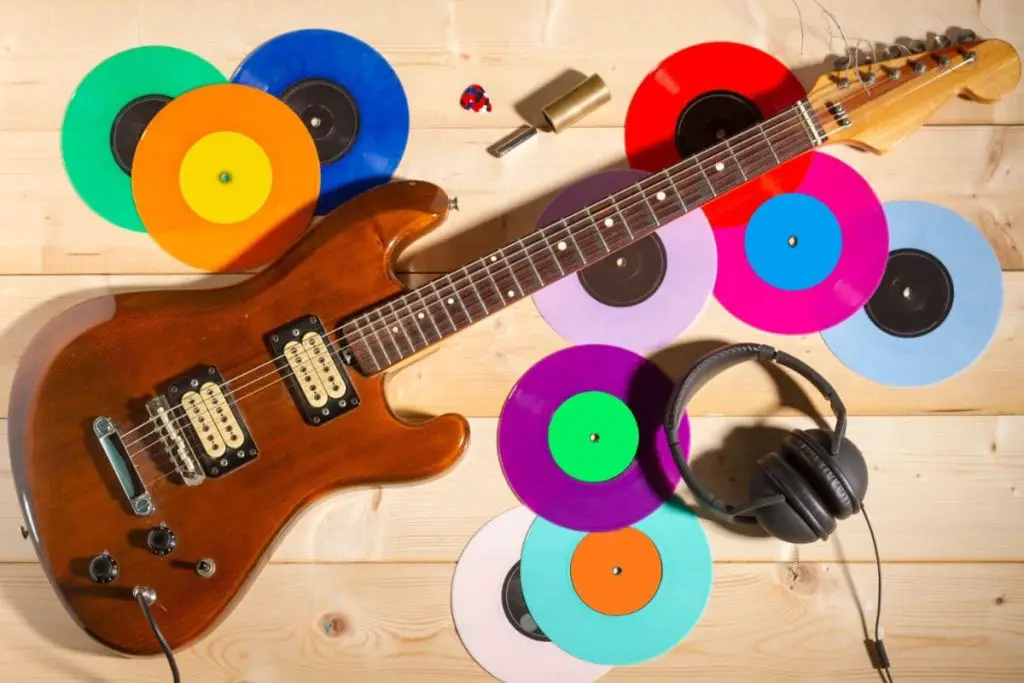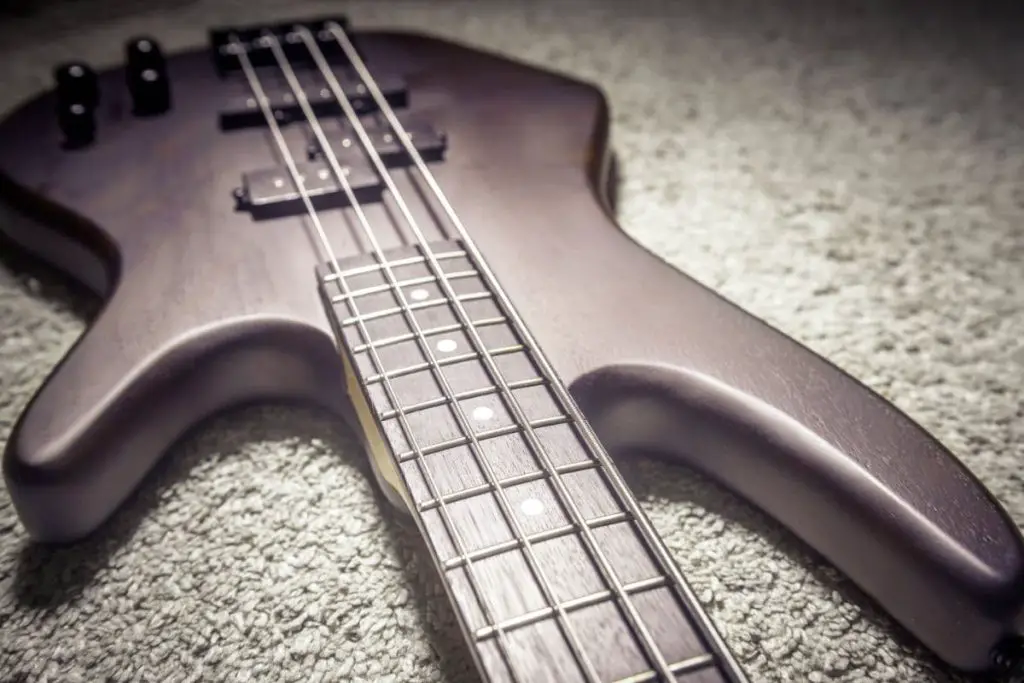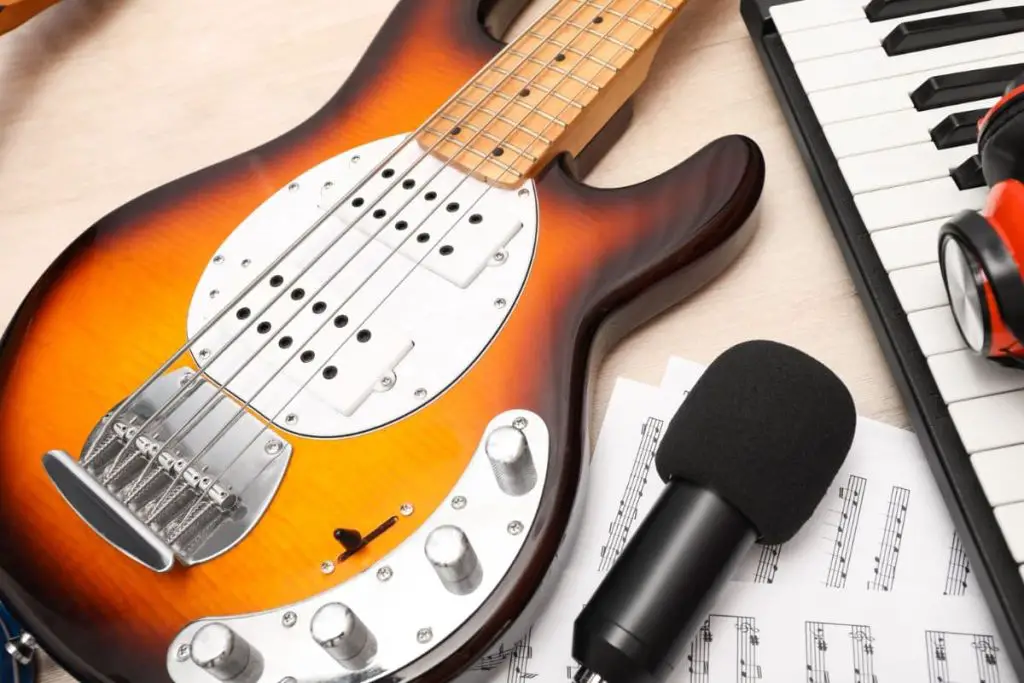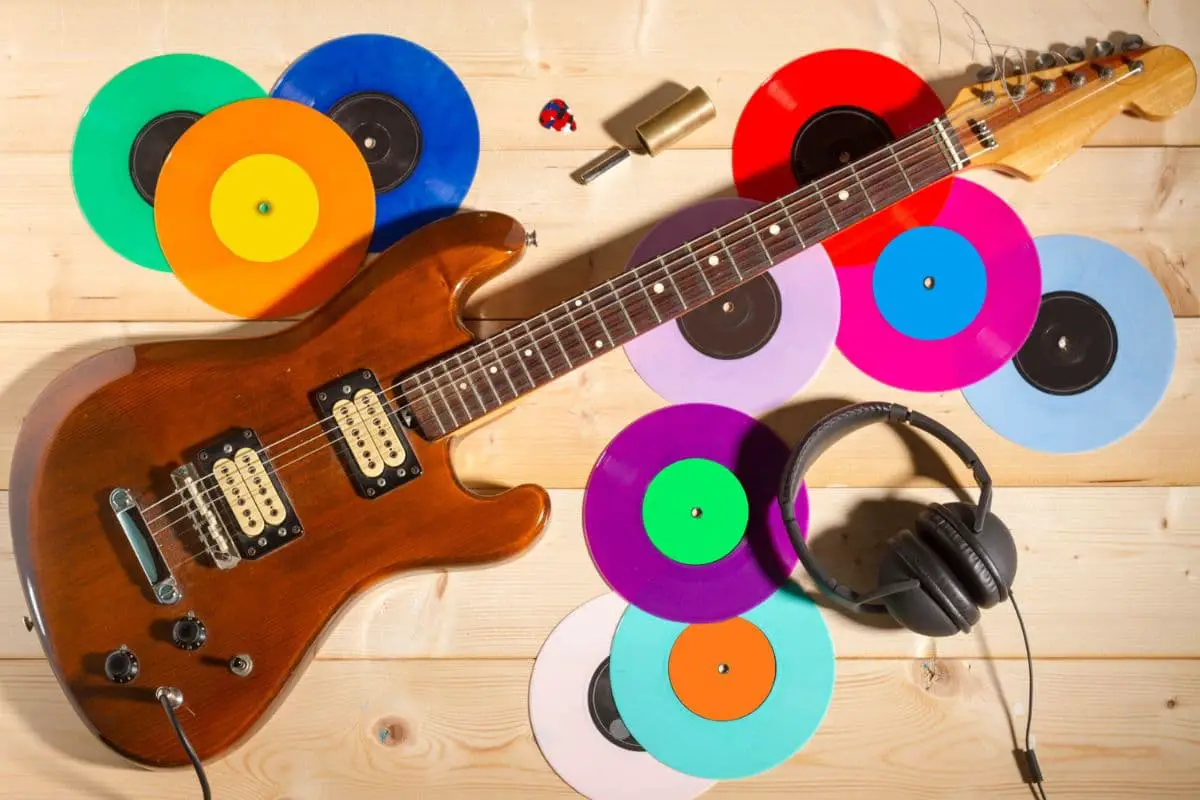Electric guitars are typically amplified and loud. If you want to make a statement with your music, an electric guitar is the way to go. However, some people have trouble making their electric guitars loud enough to play over the drums, vocals, and other instruments in a band. You might also want to make more noise just to immerse yourself in the music.
To make your electric guitar louder, turn up the amp, upgrade your amplifier, and adjust the pickup. You can also use heavy picks, thick strings, and bigger speakers. Adding a booster pedal and a microphone can make a world of difference for those looking to increase their electric guitar’s sound.
In this post, we’ll cover multiple ways to make your electric guitar louder. We’ll also provide a few product suggestions to get you started.
👇😀👇NOTE👇😀👇
If you want to find out what my recommended guitar gear is, then here is what I recommend on Amazon:
- Fender Cutaway Acoustic-Electric Guitar Bundle (MY FAVORITE GUITAR😀)
- Snark SN-8 Super Tight All Instrument Tuner (Easiest Tuner I’ve Used😏)
- 6 String Acoustic Guitar Capo (Best CAPO for quick changes)
- Dunlop Max Grip 1.0mm Nylon Picks (Thick Guitar Pick So You Don’t Lose Grip!)
- Universal Guitar Stand (Cheap & Minimalist Guitar Stand I Recommend)
- Levy’s 2″ Wide Quick Adjust Guitar Strap (Best Guitar Strap For Any Level)

Adjust Your Amp
Adjusting an electric guitar’s amplifier will make a huge difference. Not only does it let you change the volume, but you can also switch the gain, treble, bass, and many other settings. Some amps have more adjustments than others, so it’s important to keep an eye out for an amp that suits your taste.
Here’s an in-depth look at each of the adjustments you can try to make your electric guitar louder with an amp:
- Turn up the volume. Perhaps the most obvious suggestion is to crank up the volume on your amp. Most people use amplifiers to make their music louder, but they have plenty of other settings that are worth looking into. Adjust the volume to your desired setting, then try some of the suggestions below.
- Increase the gain. The gain and volume often get mixed up on amplifiers and digital audio workstations. While the volume makes the amp (and electric guitar) louder, the gain increases the tone. The tone and sustain will drastically increase the longevity of the electric guitar, making it seem louder.
- Adjust the bass as necessary. It’s no secret that bass-packed riffs sound a bit louder. This is because they last longer than instruments without enough bass. Much like increasing the gain, raising the bass on your amp will increase its sustainability and resonance.
- Monitor the treble. Your amplifier’s treble determines how loud and intense the higher notes sound. When the treble is too high, it can make the amp sound tinny. It can also overwhelm the bass, making your electric guitar sound tacky and toyish. However, slightly increasing the treble can make your guitar sound louder.
- Check the favored outputs. Some amplifiers let you favor one output or input over another. For example, if you have a microphone and an electric guitar hooked up to the same amp, you can favor the electric guitar over the microphone. This means you’ll hear the guitar a bit louder and clearer.
Move the Guitar’s Pickup
According to Build Your Guitar, your instrument’s pickup directly influences the sound output. If it’s in the wrong position, your pickup can buzz the strings or alter the guitar’s intonation. Furthermore, placing it at a slight angle will favor one set of strings more than the other. It’s all about knowing the proper placement.
Try these suggestions for different results:
- Neck placement: Keeping a pickup on the neck is a popular choice for acoustic guitars because it emphasizes the low tones and resonance. However, you can use this placement on an electric guitar if you prefer a bass-packed performance. Remember to keep the pickup from touching anything else on the instrument.
- Bridge placement: A lot of electric guitars have their pickups placed near the instrument’s bridge. The bridge placement highlights the treble, which vibrates from the higher strings. You can use this placement if you play a lot of solos that you want to remove excess bass.
- Slanted placement: The slanted placement technique lets you choose which strings are louder and more prominent. For example, slanting the pickup closer to the bridge on the high strings and close to the fretboard on the lower strings will make it quite a bit louder across the board.
- Flat placement: Most electric guitars have flat pickups. They don’t have a slant, which means the angle can’t highlight all of the strings. These pickups are usually near the bridge on electric guitars as mentioned above. However, you can adjust a flat pickup and turn it into a slanted pickup if desired.
Keep Your Electric Guitar in a Small Room
Playing your electric guitar in a small room naturally traps the sound waves. When the sound waves can’t travel too far, they have more sustain and resonance. They’ll also sound much louder than if you played the instrument outside or in a large, open room. Place a few pieces of furniture or wall art in the space to prevent too many echoes while you’re recording.

If you don’t have a room that’s small enough to prevent sound wave issues, you can load it with furniture, rugs, and soundproof foam. Soundproof foam covers the walls and ceilings in any room, trapping the sound waves and preventing excess white noise while recording. It can also make the amplifier much clearer.
Quick Note: No matter what room size you play your electric guitar in, make sure you close the doors and windows. These exit points allow sound waves to leave the room, preventing them from resonating. Your electric guitar will sound much louder when everything is sealed since the sounds will stay in the room.
Get a Bigger Amplifier
Amplifiers come in numerous sizes. If you have a small amp, it’s no secret that it won’t put out much noise. Some small amps are specifically designed for apartments and other shared living arrangements. If you have a compact amp and you want more noise output, you could put a microphone and some speakers in front of it.
That being said, we suggest upgrading your amplifier. Nothing beats a high-quality amp when it comes to sound manipulation and control. You can crank it up as loud as you want and turn it down when it’s too late to wake up the neighbors. Make sure you keep the amp off the floor if you want to reduce the vibrations going through the walls.
The Fender Champion 50XL Amplifier is an excellent example of a high-end amp that doesn’t cost too much. You can also try the 20, 40, and 100 variants if you prefer smaller or bigger speakers. You can control the volume, gain, treble bass, FX, and many other features from this top-notch amplifier for your electric guitar.
Try a Heavier Guitar
According to Pro Sound HQ, a heavier guitar will make the instrument much louder. Many people know heavier, larger acoustic guitars sound louder, but did you know that the same rules apply to electric guitars? The large body directly influences the instrument’s sound output, making it a crucial part of the decision-making process.

So, why do heavier guitars sound louder? Consider these explanations:
- A larger guitar body sustains the sound much longer. Sustain refers to how long the sound sticks around. You’ve probably noticed the thicker strings (the low E, for example) last a long time, whereas the thinner strings don’t sustain as long. The same situation applies to having a thicker guitar.
- Bigger guitar bodies have more room for resonance. Sustain and resonance are very similar. However, resonance refers to the clarity of the sound carried through the sustained volume. For example, if you have a long sustain, the resonance will help the music stay clear and crisp for several seconds.
- Heavy instruments have more tone than lightweight instruments. An electric guitar’s intonation refers to how much it sounds in tune going up the fretboard. If you have a heavy electric guitar, it’ll have more tone, thus sounding more in tune and uniform through the sustain and resonance.
Whether you choose a lightweight or heavy electric guitar, you can still employ all of the tips and tricks in this post. For example, a lightweight guitar can be quite loud with a slanted pickup and a thick set of strings. Read on to learn one of the simplest suggestions that you can use to make any electric guitar sound louder.
Always Use a Pick
Fingerpicking is incredibly popular on acoustic guitars and electric guitars, but it undoubtedly alters the volume and tone. If you fingerpick, you’ll reduce the volume, resonance, and sustain. Furthermore, you can adjust the sounds coming out of your guitar by growing longer nails or picking with different parts of your finger.
However, fingerpicking isn’t nearly as loud as using a traditional guitar pick. Using a pick drastically increases the vibrations going through the strings, which means there will be more volume, sustain, and resonance. Switch to thick, heavy picks if you want more bass and sustain from your electric guitar.
If you prefer fingerpicking, you can use fingerpicks. They go over each of your fingers on your strumming hand. They feel like long nails and take a few sessions to get used to, but they’re much louder than standard fingerpicking. You can also put one fingerpick on your strumming thumb and hold a regular pick if you want to switch it off.
Play Through a Computer Speaker Setup
Computer speakers are often louder than small amps. If you have a tiny amplifier and no room or budget to upgrade, consider amplifying your electric guitar through the computer. All you need is the right cables (these could range from USB cables to MIDI setups and audio interface wires), a computer, and a decent speaker system.

Follow this step-by-step tutorial:
- Connect your electric guitar to your desired output. We prefer audio interfaces because they provide some of the best digital signals from your electric guitar to the computer. Most computers register the audio interface immediately, so they’re plug-and-play. Choose between USB and many other outputs.
- Open a digital audio workstation. There are countless digital audio workstations, some of which cost a lot of money, and others that are free. The most popular DAW is Apple’s Garage Band. This software lets you plug your electric guitar (and other instruments) into your device and make numerous adjustments.
- Connect your computer to your speakers. Your speakers determine how loud your electric guitar can get. If you have high-end, loud speakers, there’s no doubt you’ll get them to be a bit louder than a compact amplifier. However, low-quality, tiny speakers won’t do very much for your electric guitar’s sound output.
- Adjust the digital audio workstation to the required settings. Much like physical amps, you can turn your DAW into a digital amp. Change the gain, volume, treble, bass, and many other factors all on one interface. These settings let you determine how louder your electric guitar is and what it sounds like.
Swap Your Guitar Strings
Your guitar’s strings can directly alter its sound and volume. Sound Adventurer recommends getting heavier, thicker strings if you want to make your guitar louder. Not only do thick strings increase the volume, but they also make the sounds sustain and resonate much longer than usual.
If you’re looking to upgrade your strings, consider switching to a .014” gauge. Guitar string sets are typically sold by the smallest gauge (the high E string). You can get strings as small as a 0.08” gauge, but they’ll be light and bright. Stick to heavier strings for louder playstyles. You can also choose thinner, lighter strings for the strings you want to have more treble.
If you switch your electric guitar strings, consider taking the time to adjust the pickup (if necessary). Adjusting the pickup and the truss rod is much easier without strings. The truss rod ensures the action doesn’t get too high or low, which can prevent quiet chords and unwanted fret buzzes.
Add a Booster Pedal
Pedals can greatly improve your guitar’s performance. You can use them with any kind of guitar, though they’re perfect for amplifying an electric setup. Not only do these pedals increase the volume, but they can also change the gain and many other audio qualities.
Here are the two primary pedals you can use for volume purposes:
- Volume pedals: The Ernie Ball Volume Pedal lets you control your electric guitar’s volume. Press the pedal whenever you’re ready for a solo or when you want to get a little more sound out of the instrument. This pedal includes durable cables, a passive (battery-free) power supply, and more.
- Boost pedals: Boost pedals work very similarly to volume pedals. Rather than increasing the overall volume, these pedals increase the gain and tone. Some boost pedals increase different effects than others, so it’s worth checking out various boost pedals to find out which one is best for your electric guitar.
Both of these pedals will make your electric guitar much louder and more noticeable. Whether you prefer a direct volume increase, more bass, or something in between, there’s a pedal for every electric guitar player.
Use a Microphone
Contrary to popular belief, microphones aren’t only used to record and project vocals. You can use various microphones to amplify your electric guitar or increase the amp’s volume. There are countless types of microphones you can use, but only a handful of them will get the job done. It’s also essential that you know how to use the mic with your electric guitar.

Keep these tips in mind:
- Place the microphone at a 45-degree angle. Putting the microphone directly in front of the amp or speaker will make it much harder to hear each note. The 45-degree trick separates each of the tones, making them sound much clear while amplifying the volume through a set of speakers.
- Make sure you have a unidirectional microphone. Unidirectional microphones only pick up sounds from one direction. If you use a microphone that pulls sounds from multiple directions, you’ll have too much white noise coming through the speakers. Make sure the open end of the mic is facing directly at the amp or guitar.
- Connect the microphone to nearby speakers. Place the speakers wherever you want the sound to go. For example, if you’re playing in a small room, you can keep them as far apart as possible. However, playing the electric guitar in a large room lets you keep the speakers fairly close to you without causing too many echoes.
- Consider placing the microphone in front of an amplifier. If you don’t have the mic in front of your computer speakers, you could put it right in front of the amp. This setup makes your amp significantly louder. Keep it a couple of feet away from the amp, then test it until you find the perfect distance.
Final Thoughts
Whether you choose to get new equipment or change your play style, there are many ways you can make your guitar louder. You don’t need the most expensive gear or high-end guitars to make a noticeable difference. Try some of the suggestions above to find out what helps you elevate your electric guitar to your preferred volume and clarity.
👇😀👇NOTE👇😀👇
If you want to find out what my recommended guitar gear is, then here is what I recommend on Amazon:
- Fender Cutaway Acoustic-Electric Guitar Bundle (MY FAVORITE GUITAR😀)
- Snark SN-8 Super Tight All Instrument Tuner (Easiest Tuner I’ve Used😏)
- 6 String Acoustic Guitar Capo (Best CAPO for quick changes)
- Dunlop Max Grip 1.0mm Nylon Picks (Thick Guitar Pick So You Don’t Lose Grip!)
- Universal Guitar Stand (Cheap & Minimalist Guitar Stand I Recommend)
- Levy’s 2″ Wide Quick Adjust Guitar Strap (Best Guitar Strap For Any Level)
Related Posts:

